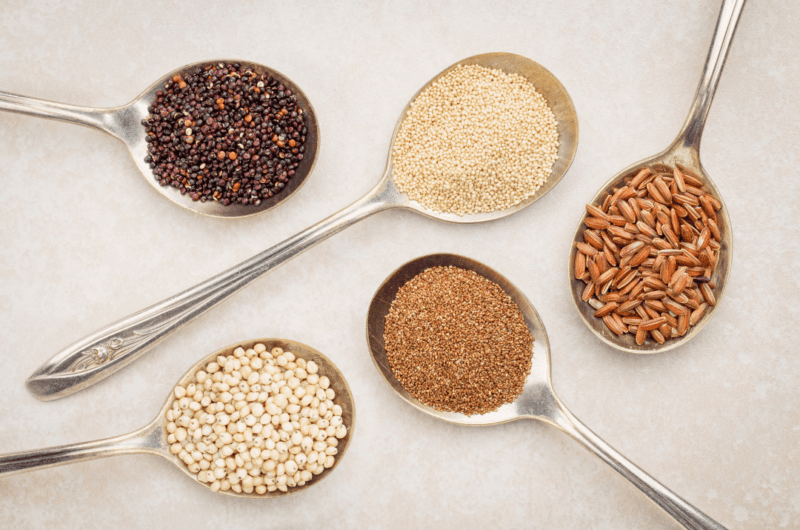What’s the difference between celiac disease and a gluten intolerance?
You might have heard of the gluten-free diet, gluten-free menus, or even gluten-free products. Suddenly “gluten-free” seems to be everywhere! In the past couple of years, a lot of people can’t seem to eat or tolerate foods that contain gluten. There are various reasons for this, and we must be particularly careful to not jump into internet trends without the proper knowledge, guidance or true scientific citations.
Gluten free seems to be a controversial topic, but for most healthy people, a strict gluten-free diet is not necessary.
And let me tell you why!
Studies show that gluten-containing whole grains are heart and gut beneficial. Avoiding them can actually decrease your microbiome diversity if you don’t have celiac disease and your microbiome was healthy to begin with!
So, you could be creating a problem (if you avoid gluten) that didn’t previously exist! However, if your experience is one where you don’t feel well eating gluten-containing whole grains, I recommend getting a full work up to get to the bottom of your issues.
But keep reading…
In this article I am going to explain the difference between the two main causes of digestive issues due to gluten consumption. First, let’s discuss what gluten actually is.

What is gluten?
So what is gluten, exactly? Gluten is a naturally occurring protein that exists in many types of foods, even some you might not expect. It can also be extracted and used to help some processed foods hold their shape.
What foods contain gluten? It is found in wheat, rye, barley, spelt, and other grains such as triticales. Sometimes gluten can be detected in oats if processed with other foods that may contain gluten through cross contamination.
Gluten is present in many ordinary processed foods such as bread, cakes, cookies, pastries, pasta, cereal and beer and can even be found in some unexpected places like toothpastes, vitamins, cosmetics supplements, and medications. So basically gluten is everywhere!
But it’s not all “bad!” Gluten found in whole, unrefined grains has been a key source of energy, protein, soluble fiber and nutrients for humans for centuries. On the other hand, gluten that is in highly processed foods is so refined that it is barely similar to the whole wheat plant, stripping it of many of its beneficial and gut-healthy properties and possibly making it harder for the body to properly assimilate.
Gluten can be broken by the healthy human digestive process, but sometimes it can’t completely do so, causing the protein to pass, undigested, to the small intestine. Most healthy individuals can handle the process of eliminating the undigested gluten with little or no trouble, but for others it might cause problems, leading to uncomfortable symptoms and even a severe autoimmune response.
Do you have a negative reaction to gluten? There might be several medical reasons why you might have a negative reaction to gluten including wheat allergies, gluten intolerance, and a chronic autoimmune disease like celiac disease.
Celiac disease and gluten intolerance are often confused. They share similar symptoms, but are very different from each other. For that reason, it is very important to get properly evaluated by a specialist to determine which one you might be suffering from and get the right treatment, before self-prescribing diets or restrictions (or Googling!).
Let’s compare both, so you can better assess your symptoms with your doctor.
What is Celiac disease?
Celiac disease (also known as celiac sprue or gluten-sensitive enteropathy) is a serious immune response in your small intestine to gluten consumption. It is the most severe form of gluten intolerance and affects about 1% of the population. It can develop at any age and it’s hereditary, meaning patients diagnosed have a genetic predisposition to the disease.
As the body is triggered, it “attacks” the gluten (as if it were a virus or bacteria) causing damage to your small intestine lining and preventing it from absorbing nutrients properly. People with celiac disease also have high levels of particular antibodies in their blood, which can be tested to confirm. Your healthcare provider might also do an endoscopy and a small intestine biopsy to see how much damage has been caused.
What are the symptoms of celiac disease? Celiac disease primarily presents as digestive problems such as diarrhea or constipation, weight loss, bloating, gas, abdominal pain, nausea and/or vomiting. But it can also have signs and symptoms unrelated to the gastrointestinal process such as fatigue, anemia, joint pain, osteoporosis, depression, headaches, mouth ulcers, nervous system injuries and reduced spleen function, among others. This can make it difficult to promptly diagnose.
If you suspect you might have celiac disease, please try and get evaluated and diagnosed by a medical professional, asap! Left untreated and in the long term, celiac disease may cause tissue damage, unintended weight loss and malnutrition, anemia, rashes, infertility, severe digestive issues and discomfort, and increased risk for other health problems.
Celiac disease has no known cure or specific pharmaceutical treatments. We can treat the disease with medications and a strict lifelong no-gluten diet to manage symptoms and help the intestinal lining heal. It does take time for your body to heal and adjust, but you will feel better.
If you are diagnosed with celiac disease, it is important for you to work with your doctor and/or a registered dietician to help you understand what you should avoid eating and plan a healthy no-gluten diet.
What if you don’t have celiac disease or allergies but you still experience symptoms of a negative reaction after eating foods that contain gluten? You may have a gluten intolerance.
What is Gluten intolerance/sensitivity?
How do you know if you have a gluten intolerance? Gluten intolerance, or non-celiac gluten sensitivity, is when you experience digestive issues after consuming gluten. Around 6% of the US population has a gluten intolerance and it is more common in women.
The exact causes are not well known, but many patients with gluten intolerance also have IBS. Some research indicates that it may be a specific carbohydrate sensitivity or their bodies don’t absorb it as it should, remaining in their intestines, causing symptoms. Other research shows wheat may affect the lining of the intestine’s job of keeping bacteria from escaping and allowing it to reach the blood or liver, causing inflammation.
What are the symptoms of gluten intolerance? Gluten intolerance symptoms are similar to those suffering from celiac disease: digestive problems (abdominal pain, bloating, gas, diarrhea or constipation, nausea and vomiting), mental health problems (depression and/or anxiety), rash, joint pain, headaches, anemia and brain fog, among others.
There is also no prevention or cure for gluten intolerance, but symptoms can be managed with a gluten-free, high-fiber, low-fat, probiotic rich diet. Integrative practices such as lifestyle changes and stress management techniques may also help.
If your doctor suspects gluten intolerance, as part of the treatment plan, you might be asked to eliminate and reintroduce gluten into your diet to confirm. If there is no significant change in symptoms, gluten might not be the cause. Don’t get discouraged! We will continue to search until we have an answer!
People with gluten intolerance who consume it every now and then probably won’t see any long-lasting effects or health problems, but remember – the more you consume it, the higher the probability you will experience uncomfortable symptoms.
It is important to clarify that both gluten intolerance and celiac disease are not to be confused with a wheat allergy. With a food allergy your immune system overreacts and “attacks” the food as if it were a foreign object. It might cause you immediate allergic reaction symptoms like itching, vomiting, swelling, or shortness of breath or even life-threatening anaphylaxis. A very small number of people in the U.S. have a wheat allergy.

What to do if you suspect you might have a gluten intolerance
If you think you might have digestive issues caused by gluten you should consult your doctor and/or nutritionist to correctly diagnose you before trying a gluten-free diet. Such a restrictive diet, without the proper guidance and monitoring, can increase your risk for an inadequate nutritional consumption and high blood sugar.
Unless you have celiac disease, a strict gluten-free diet might not help you completely manage your symptoms. Self-prescribing a gluten-free diet might also prevent you from obtaining a celiac disease diagnosis because the tests can yield a false negative, since there is no gluten in your body to trigger symptoms and/or antibodies.
If you do not have a confirmed diagnosis, you should always strive for a balanced diet full of natural, whole healthy foods with lots of fruits and veggies!
Whether it’s Celiac disease, gluten intolerance, or some other issue, Planted Forward can help!
You can always book an appointment with me or my amazing colleagues at Planted Forward. We offer Family Medicine, Gastroenterology, and Cardiology services, all provided by trained integrative physicians. We also have IBD and integrative registered dietitians and health coaching services to further support your health.
Do you need help managing your gastrointestinal symptoms? Or are you simply looking to be as healthy as possible? I’m here to help! If you want to maximize your gut health, you can purchase Doctor Méndez Introduction to Gut Health here or book an appointment with me today to get the support you deserve.









